 The Long Haul
The Long Haul
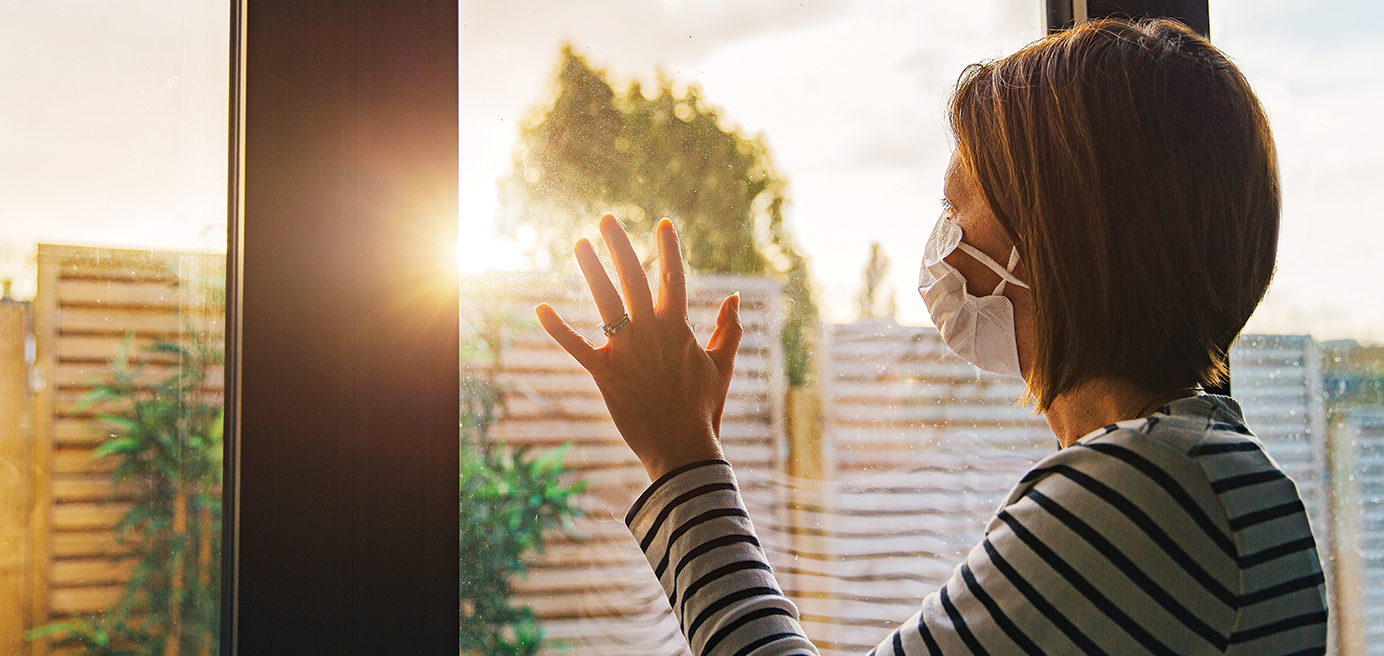
For some BCNU members, COVID-19 has brought life-changing consequences
There is no question that when it comes to treating the survivors of COVID-19, we are "learning as we go." Many of the long-term effects of the disease have yet to be studied and understood.
By April 2021, there were over 100,000 COVID-19 cases in BC, with more than 5,000 requiring hospitalization and almost a third of those patients needing admission to an intensive care unit.
Most people who contract COVID-19 recover without complications, but many do not.
An estimated 10 to 20 percent of patients labelled as recovered experience symptoms that last longer than six months. These are the so-called "long-haulers," a small but growing group of British Columbians who continue to struggle with the after-effects of the illness months after tests reveal they are virus-free.
Any one of these patients can end up with profound and prolonged conditions, including tightness of chest, fatigue, chills or sweats, body aches, dry cough, elevated temperature, headaches, "brain fog," breathlessness or concentration challenges.
A 2020 survey of COVID-19 long-haulers conducted by "citizen scientists" in the US, Canada and UK called "Patient Led Research for COVID-19" found that only about 20 percent of respondents said they'd made a full recovery by day 50, and 65 percent said they considered themselves unrecovered and mostly sedentary.
At present, many Canadians labelled as recovered are not currently receiving adequate rehabilitation and community support upon their discharge from hospital. Canada has to-date set up only eight post-COVID-19 multidisciplinary specialty clinics to treat long-haulers. Fortunately, three of them are in BC (see sidebar on page 32).
Health-care workers make up a significant portion of COVID-19 cases, so it's no surprise that nurses are among this group that now finds itself facing the unknown, and on a journey that may have no end.
Update Magazine spoke with three BCNU members who contracted the virus in 2020, but who have yet to fully recover. What follows are accounts of their illness, and struggle to return to work and a life of normalcy.
Read about long-haul experiences from Audrey Vanderhoek, Simi Ono and Katie Borrett.
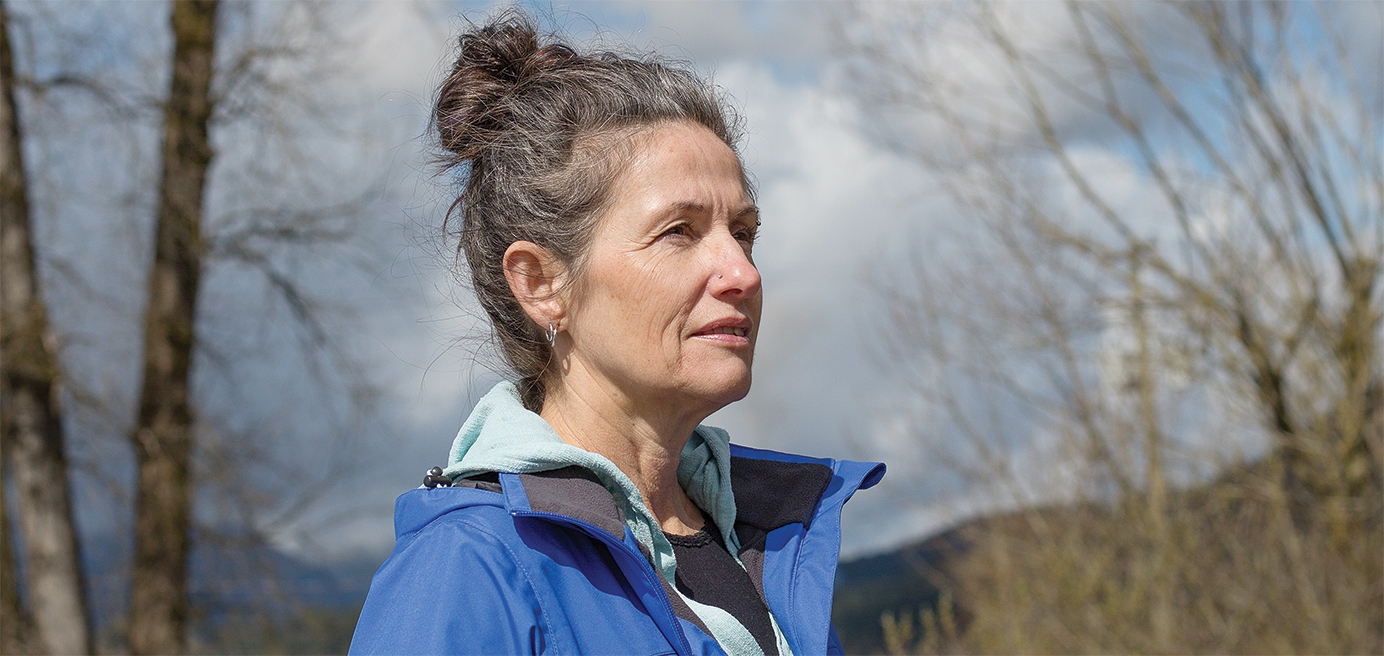
LIFE UPSIDE DOWN Before contracting COVID-19, Chilliwack's Audrey Vanderhoek was an avid hiker and martial artist. Almost a year into her recovery process, she is unsure if she will ever again work full time.
Chilliwack's Audrey Vanderhoek has spent most of her 30-year nursing career working in long-term care. "I love my co-workers, my residential care coordinator is a gem and the doctors are by far the most caring compassionate and present individuals I could hope to associate with," she says.
Until last spring, Vanderhoek worked at Abbotsford's Cottage-Worthington Pavilion, a Fraser Health-operated single-story residence and adjoining privately run rehabilitation unit that shares a nursing station and dining area.
The COVID-19 outbreak that began on the rehab unit in the early days of the pandemic resulted in a devastating loss of life.
Vanderhoek recalls expressing concern about the possible spread of COVID-19 from the rehabilitation unit. "Letters were written, and it was widely discussed openly with higher-ups." But after speaking to her employer about the need for better access to personal protective equipment and improved staff safety, she says she was dismissed with an "it's all fine."
"But it was not fine, not fine at all," she reports, and argues that the mismanagement of the rehab unit is why she became sick – and is still sick to this day.
Vanderhoek's COVID-19 journey began when she started to experience mild influenza-like symptoms. But it soon became evident that she had contracted much more than seasonal flu. "By day eight or nine, I had brain fog, chest pain, tightness, shortness of breath, sinus pain, weird heart palpations, dizziness, nausea," she recalls.
Vanderhoek tested positive for COVID-19 on May 2, 2020 and self-isolated for 26 days. "I had anxiety like nothing I have ever experienced before. The exhaustion was crazy – all I did was sleep."
Before becoming positive, Vanderhoek would have described herself as a fit and active nurse. "I practised martial arts and was an avid hiker," she says. Now, she was off work, assigned a WorkSafeBC case manager and monitored by a public health nurse.
The illness is like nothing Vanderhoek has ever experienced before. After a brief reprieve from some of her symptoms in early June, she was soon inflicted with yet another flare up and went for multiple tests that included an electrocardiogram and blood work. Yet the results came back normal.
"The exhaustion was crazy – all I did was sleep."
Vanderhoek was finally without chest pains for the first time in August. But she sought care from a naturopath to address other lingering symptoms. "I was looking for relief for the dizziness, neurological pain in my gums and face, nausea, general brain fog and the chronic fatigue," she says.
The supplements Vanderhoek was prescribed led to some minor improvements, but she says she still had low energy, was unable to multi-task and had no tolerance for everyday activities like TV watching. She tried to keep life simple to aid her recovery. That meant prioritizing sleep, taking walks and doing housework only when necessary. "I still had brain fog, fatigue and memory issues. I could not get my brain to put things together," she recalls. "And I would become so overwhelmed by emotion under the circumstances."
Vanderhoek's efforts to maintain a simple life were disrupted in the summer when her aging parents, needing care, moved from Alberta to BC, and her teenage son moved back home. Her inability to deal with stress was exacerbated further when WorkSafeBC presented her with a graduated return to work schedule that would see her begin working on Sept. 21 and resume her full regular job duties after Oct. 16 – a decision that was made despite the several notes doctors had written on her behalf.
She appealed the decision with the support of a BCNU WCB advocate, who arranged for long-term disability coverage pending the outcome of her appeal. Fortunately, she received a favourable result this March, when it was determined that Vanderhoek remains unable to return to work.
British Columbia has a network of three post-COVID recovery clinics connecting long-haulers like Vanderhoek with specialized care (see sidebar on page 33). It was not until Vanderhoek was referred to the St. Paul's Hospital COVID clinic in Vancouver that she says she was told that what she's experiencing is real, and not "in her head." Before going to the clinic, she says she doubted herself, and would think, "is this really happening?" But specialists in the program made Vanderhoek feel safe. She wants others who have had COVID to know that "they should not be afraid to speak up, it's a journey, don't give up."
Today, Vanderhoek is still a participant at the St. Paul's COVID clinic, where she's being monitored and assessed. She's also a subject in on-going research that's conducted by respiratory therapists and others.
WorkSafeBC is still in the process of determining whether further treatment is required, and if retraining or accommodation is necessary.
Vanderhoek continues to work on her cognitive stamina pacing and says she's happy with her recovery process.
"There's been improvement, albeit slow," she reports. "I anticipate a full recovery, that is my goal. But I'm not sure I will ever have the mental or cognitive endurance to withstand the pressures of nursing as I did before."
Every day, Vanderhoek contemplates what's next. "If I'm not given the time, the proper job and possibly part-time hours, I will have no choice but to leave the profession."
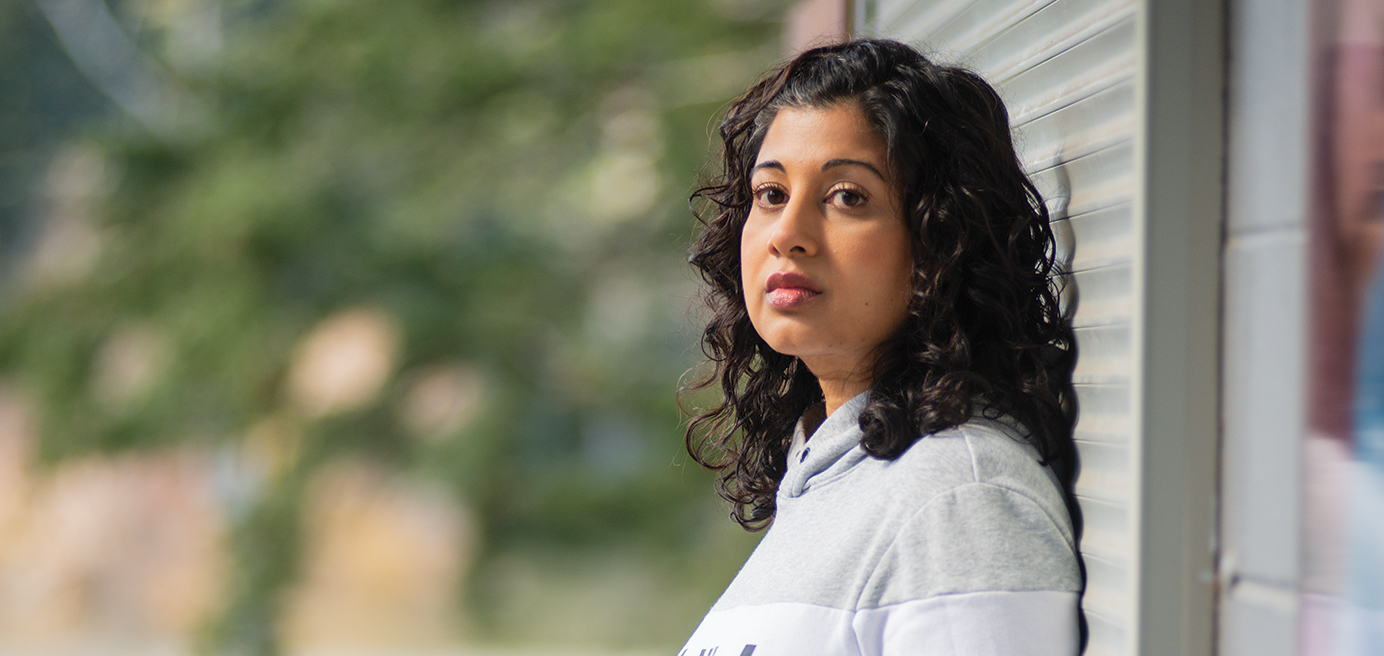
ONE DAY AT A TIME Victoria's Simi Ono says the hardest part of her recovery from COVID-19 is the unpredictability of the illness, and not knowing what her energy level will be like from one day to the next.
Nursing is Simi Ono's second career. After graduating from the University of Victoria, the RN started working as a home care nurse for Island Health and also served as a community and public health nurse in WSÁNEĆ territory on the Saanich Peninsula. When COVID first emerged onto the global stage in early 2020, Ono was involved with pre-pandemic planning, education and COVID screening in the community.
Prior to nursing, Ono worked as a respiratory therapist in Alberta, primarily in critical care. She says she was struck by the disparity in care provided to Indigenous and non-Indigenous people, and credits her awareness in part to the fact that she is a second generation settler of South Asian descent. "I noticed a lack of cultural awareness or understanding for minorities within health care around care and particularly beliefs around death, passing and the importance of traditional ceremonies," she remarks. "This was part of my motivation to work with the Indigenous population."
Ono accepted a new full-time position at Victoria's Royal Jubilee Hospital in June 2020, working on Island Health's Indigenous Health & Diversity, Equity and Inclusion team.
Weeks later she began feeling extremely tired, but attributed it to the new role. "I was just so tired, I told myself I was overloaded from a new position," she says. Despite not having a fever, Ono remembers having "hot breath," feeling like a lead weight and developing a runny nose. She decided to call in sick, get tested and then self-isolate while waiting for the result and trying to explain her symptoms away. "I have allergies and they also make me tired," she remembers thinking.
Ono says it was her 13-year-old son who tossed the cordless phone to her in the bedroom so she could hear the results. The mother of two had tested positive for COVID-19. Ono says she was immediately concerned about whom she was in contact with. Despite being unwell and feeling lethargic, she says it was pure adrenaline that pushed her to immediately share contact tracing details with a nurse to help ensure others would be safe.
From the moment she hung up, Ono's condition only worsened. She describes having a heavy chest, difficulty breathing, a loss of smell, gastro-intestinal pain, a low fever and nausea. But she was determined to conserve what little energy she had. "Being a respiratory therapist, I was mindful of my breathing, as even speaking would exhaust me," she says.
"Early in my acute phase of recovery, while on complete bed rest, I was laser focused on my shortness of breath and tried to monitor my own vitals – it gave me something to focus on," she recalls. "As my signs and symptoms progressed, changed and new ones appeared, it just never went away entirely. Today I still have trouble with random heart palpitations, random tachycardia, extreme fatigue and delayed onset muscle fatigue and weakness."
"The whole thing had affected my cognitive, emotional and physical state."
After her diagnosis, Ono was in regular contact with a public health nurse and Island Health's occupational health department, which had alerted WorkSafeBC. "In the beginning, you are not in your right mind, you're at your most vulnerable. They are asking you very specific questions and there were lots of grey areas," she recalls. At the time, WorkSafeBC was in the process of revising its claims process for workers who contract COVID-19, and the legislative amendments that now make it easier for WorkSafeBC to immediately apply viral pathogen presumption for health-care workers had yet to come in to affect. Ono says she is grateful for the support of her BCNU representative who helped her navigate the cumbersome claims process.
Weeks later, after multiple trips to the ER and a battery of inconclusive tests, Ono was still not well and had added dizziness and fluctuating blood pressure to her list of conditions. "The whole thing had affected my cognitive, emotional and physical state," she says of her illness.
To aid her recovery, WorkSafeBC referred Ono to a third-party comprehensive occupational rehab program. She has since made gains through physical, mental and emotional work. Ono also asked her physician to arrange a referral to the St. Paul's Hospital long-haul COVID clinic in Vancouver, the only one in BC at the time (see sidebar on page 33). Three such clinics have since opened in the Lower Mainland, but there are none on Vancouver Island. The St. Paul's clinical team reviews Ono's locally performed lab work ups and diagnostic tests and checks in with her every three months.
Ono reports experiencing some judgment through her ordeal, and says it's disheartening to hear others speak dismissively about COVID symptoms. "Part of me is hesitant to speak about my experience, to be identified as that nurse who had COVID," she confesses. "Some people do recover quickly, without symptoms. Some die, some barely survive – and then there are the long-haulers, like me."
All the more reason for health-care workers to actively promote public health measures, she says. "Getting COVID is not worth the risk! All of the simple precautions we are taking everyday are vital."
Ono says the hardest part of her recovery now is the day-to-day unpredictability. "I never thought at my age, I would have to think about my energy in terms of how much of a charge I have in a given day – I consider it a good day when my battery is at 50 percent. The trouble is, like an old cell phone battery, when you try to fully charge it, it just doesn't last, or runs out so quickly!" she explains. "I sometimes wish others could see my charge level for the day. It's not something others can view like a broken arm, or visible disease."
Now, as Ono begins her gradual return to work, she's extremely mindful of her energy output, and grateful that her experience has been less serious than some others'. "I know I'm lucky that I never had to be intubated and that my case would be considered moderate, that it could have been far worse," she acknowledges, her voice cracking. "But it takes such a toll on you in every way – I wouldn't wish a long-haul experience on anyone."
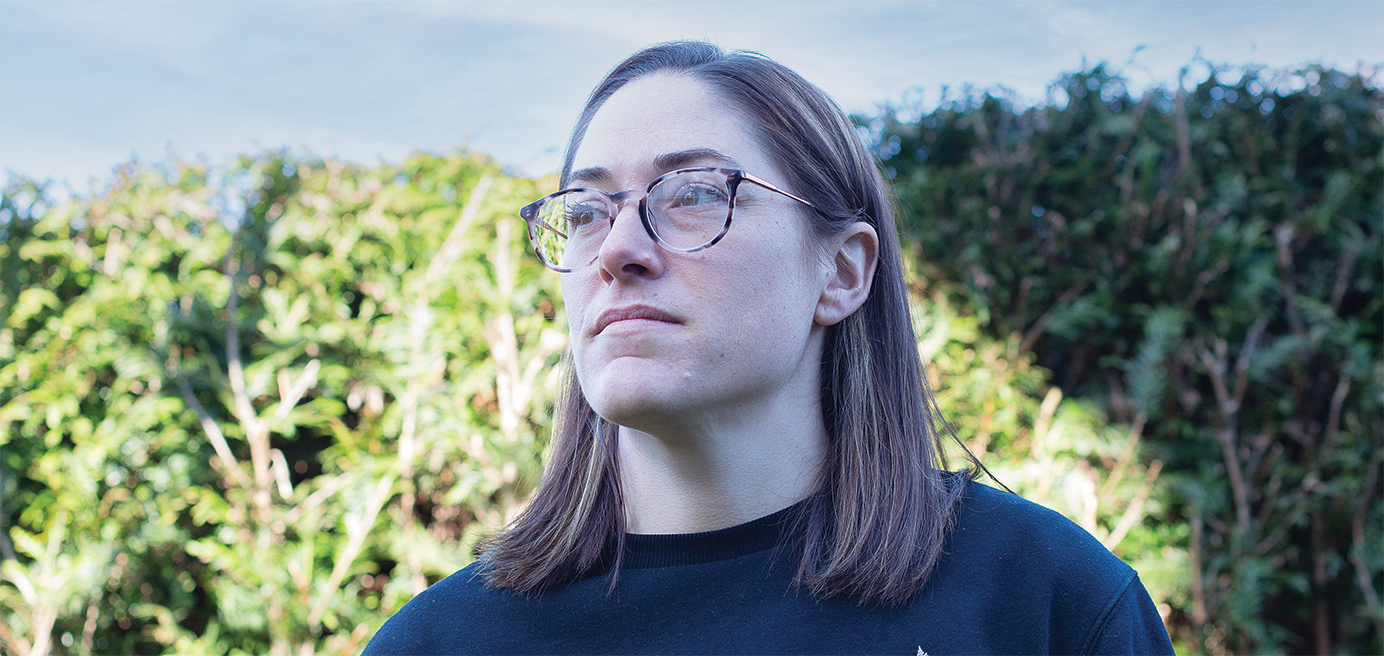
LONG JOURNEY Vancouver's Katie Borrett was among the first British Columbians to fall ill with COVID-19 symptoms in the early days of the pandemic. This fact alone has made it more difficult to claim WorkSafeBC compensation while she recovers.
In January 2020, COVID-19 was just emerging onto the world stage and the World Health Organization had not yet declared the disease a global pandemic. Still, Katie Borrett says she contracted the illness that month. No swabs were yet available to verify that she had the virus, but she nevertheless ended up with the symptoms.
Borrett was working full time in the maternity ward at Richmond Hospital when her symptoms started to manifest. "Initially I presented with mild symptoms like shortness of breath and an overall fatigue," she recalls.
Borrett carried on working through February, but by March her condition worsened and she felt unable to work any longer. She had a COVID-19 test, but the results were negative.
Still unwell in April, she went to the ER suffering from shortness of breath. The doctor on duty ordered another COVID-19 test, which again came back negative. She says her doctors were baffled, and were initially telling Borrett that her condition was not related to COVID-19. A part of her wanted to agree with the assessment. But, like other long-haul patients, Borrett knew she was not getting better.
Her co-workers were also concerned. They knew Borrett to be healthy and upbeat. The 35-year-old RN had played high-level sports and has a background in kinesiology. She herself had trouble wrapping her mind around how ill she felt as symptoms worsened – and she wondered if she was ever going to get better. She was dealing with a sinus infection, headaches and exhaustion to the point where her husband had to help her with almost every daily activity. "I'm young and fit, but he had to cook for me, bathe me, drive me to the ER for my tests – he provided total care," she reports.
Borrett's illness took a toll on her extended family as well. The youngest of five children, it was difficult for the nurse's parents to stay distanced and not be able to help their daughter on account of public health restrictions.
Entering July and still unwell, Borrett had used up all of her sick time. She reached out for support from BCNU's Workers' Compensation Board (WCB) advocacy team, and union staff helped her complete a long-term disability application. "It is a lot of paperwork to navigate at a time when you are at your weakest. My BCNU rep was wonderful, and it is moments like these that you're glad if you are a member of a union."
"What if this is for the rest of my life?"
Borrett is part of that group of workers who became sick before changes to the Workers Compensation Act, aimed at supporting workers who contract COVID-19 on the job, came into effect last summer. Bill-23, which received royal assent on Aug 14, recognizes that a worker who contracts a viral pathogen is presumed to have been infected because of their employment whenever their risk of exposure to the pathogen is significantly greater than the risk to the public at large during a public health emergency.
Borrett filed a WorkSafeBC claim in October 2020, but was denied coverage in January 2021. WorkSafeBC determined there was insufficient evidence to confirm that Borrett was exposed to COVID-19 at work. However, she believes that if tests were available when she initially became sick in January 2020, she would have tested positive for COVID-19 following an unconfirmed exposure to a COVID patient. She is now getting support from BCNU's WCB advocacy team as she appeals the decision.
Despite the challenges Borrett has faced when dealing with WorkSafeBC, she says her care-providers agree she is suffering from post-COVID symptoms, and they have eliminated all other possible sources that could cause her lingering ailments.
Last October Borrett's family doctor referred her to Vancouver's St. Paul's Hospital Post COVID-19 Recovery Clinic. Staff in the program are now monitoring the nurse's chronic fatigue, post-exertional malaise, brain fog, headaches and respiratory distress.
Borrett says she hopes for a return to work, but still struggles with the illness. "What if this is for the rest of my life?" she wonders. "I worry that I may have permanent disabilities that impact my capacity to continue a 12-hour physical job."
For now, however, Borrett's recovery is trending in the right direction. •
UPDATE (Spring 2021)
THREE CLINICS FOR ‘LONG-HAULER’ COVID-19 PATIENTS IN BC
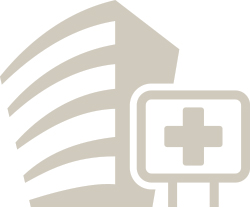
BRITISH COLUMBIA HAS A NETWORK of three clinics connecting specialized care and follow up for COVID-19 patients still suffering from an array of ailments months after testing positive for the virus.
Vancouver General Hospital and St. Paul’s Hospital in Vancouver started operating in the fall, and the Jim Pattison Outpatient Care and Surgery Centre in Surrey opened at the end of January.
Patients must be referred to a clinic by their primary care provider. It’s hoped that findings will provide researchers evidence to better understand the long-term effects of the disease.
These clinics are interdisciplinary, integrated with primary care providers, and based on a model of supportive care co-designed by clinicians and survivors of COVID-19.
The Globe and Mail reported that most patients at the trio of BC clinics will see a doctor at the facility three months after they first feel ill and then have follow-up visits after six months and then a year.
Dr. Greiner, the internist who is in charge of the clinic at St. Paul’s Hospital, told the Globe and Mail the most important treatment to date has been educating people about how their activities can lead to their symptoms flaring. Often, people experience a worsening of their ailments two to three days after they exert themselves heavily while recovering, he said.

